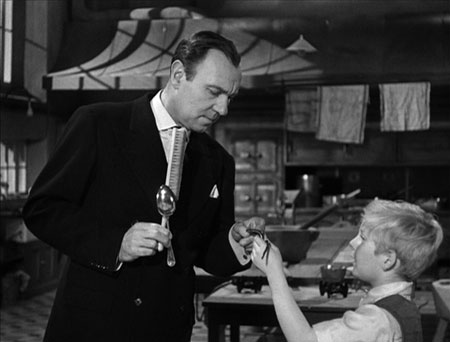Category: Cinema
Reviews of movies Adam has seen or films he has worked on.
A part of this viewing list: Criterion Collection Spine #357: Carol Reed’s The Fallen Idol.

Carol Reed and Graham Greene, what a combo. I think a large part of the reason I don’t read much modern fiction is that Graham Greene’s work is so fully satisfying that I can’t fathom a reason to try anything else. Carol Reed as well, though much of his career was spent in labor making obscure locally-aimed pieces, managed, with Greene, to make films that are exactly as satisfying as a Greene book. The Fallen Idol, despite its film noir echoing title, is full of Reed’s characteristic finesse and Greene’s subtlety. It is a story about adult shame, lying, betrayal and immaturity seen through the eyes of a young boy, who is greatly changed through his apparently tangential interaction with the involved adult parties.

This angle allows a profound access to layers of falsity that permeate the adult world, a marked contrast to the boy Phile’s wide-eyed adsorption of the same. We observe his innocence disintegrate first-hand as a result of the selfish and petty love triangle whirling around him. The butler did it. Mr. Baines is Phile’s hero, regaling him with tales out of Africa and assisting him in small mischiefs. Mrs. Baines is Phile’s nemesis, a woman who has tasked herself as acting-mother while Phile’s real mother is in the hospital, but at the same time, a woman who has no idea how to relate to a child other than in terms of totalitarian control. When Baines enlists Phile to help him cover up the truth about his affair, the plot thickens at an alarming rate.

We learn that a person can be good with children but bad at everything else, we learn just how much adult behavior can affect a child who trusts the people in charge of him and we learn how offhandedly that trust can be betrayed. The ultimate moral of the story is that one should always tell the truth despite the consequences, this comes from the mouth of the harridan Mrs. Baines early in the film, but by the end has become almost completely empathetic. I should admit right here that I watched this film twice. The second time through there are clues littered throughout, both visual and verbal, that add a distinctly Hitchcockian feel to the film. Reed’s generous use of dutch-angle, restricted fields of view and certain emphatic shot framings [a slammed cafe door that makes a Closed sign sway in punctuation, and the above shot of an important open window] turn the psychological turmoil into environmental. This is a film that hits on all cylinders throughout.

- Criterion Essay by Geoffrey O’Brien.
- Screenonline review with posters and stills. Video clips too, but only for certain educational establishments.
- Film Forum page with audio of Geoffrey O’Brien talking about the film.